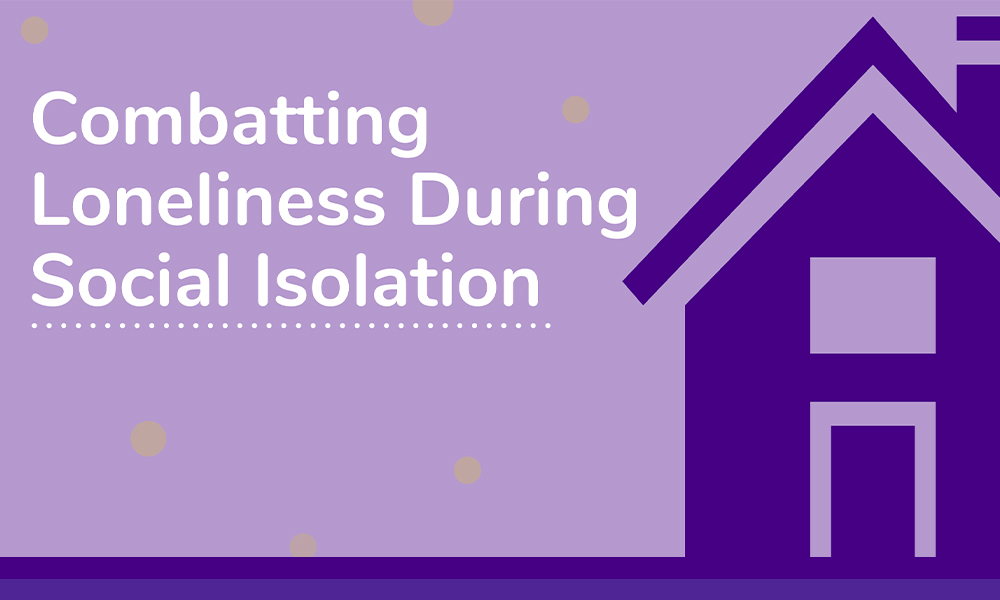Combatting Loneliness During Social Isolation
News
It is safe to say that COVID-19 has caused an unprecedented shift in the way we are living our daily lives. Empty workspaces, lecture halls, and campuses are now reminders of the changes needed to combat the current pandemic and flatten the curve. And, although older individuals can be among those who are most at risk for both serious complications resulting from contracting COVID-19 and increased feelings of loneliness (Mann et al., 2017), the physical and mental health of college students are also at risk. Fortunately, extensive research has been done on ways to combat loneliness during social isolation. There are many strategies to incorporate and build into the construction of your new daily routine.
Humans are inherently social creatures. The world thrives and operates off human connectivity, so experiencing feelings of sadness, anxiety, and boredom are completely normal amid this new culture of social distancing. The fear of oneself or a loved one contracting COVID-19 can bring up new worries and anxieties, coupled with the fact that daily routines have been interrupted, and it may seem like the world has pressed pause. Additionally, the loss of personal freedom, adjusting to the new expectations for your educational experience this year, or feelings of being trapped inside one’s own home, can be irritating, angering, and bring up a host of feelings and emotions. This, too, is normal. Extended periods of time at home, especially if we are distanced from support systems, can foster these feelings of monotony, loneliness, and irritation (Holt-Lunstad et al., 2015).
So, what are healthy ways to cope during this time? One vastly important method of combating loneliness is to use technology advantageously to regularly connect with your support system. Dr. Lennis Echterling, a clinical psychologist and professor at James Madison University, stated in an interview that amid the COVID-19 pandemic that there exists a public health threat of loneliness and that connection with loved ones in a way that promotes the individual’s wellbeing is imperative. In comparison to people with little-to-no social ties, a study done by Holt-Lunstad, Smith, & Layton (2010) found that individuals with positive social relationships had a fifty percent greater survival rate over time. Maintaining human connectivity is crucial during this time of staying at home. It can be easy to forget this aspect while navigating the uncharted waters of online classes and Zoom calls, but when feelings of isolation do brim to the surface, remember to reach out to support systems, and continue to talk to loved ones via Facetime, phone calls, texting, or even handwritten letters.
Incorporating regular self-care strategies into your new lifestyle of learning and working from home, can be just as important as staying connected to loved ones. Self-care, are those activities a person does to tend to their physical, mental, and emotional health, and can look different for everyone. Self-care activities may be attending to your basic needs (i.e. healthy sleep, healthy diet, hydration, exercise). They can include: going for a run, cooking, cleaning, meditation, applying a facemask before bed, walking your pet, finishing your homework, or reading a book. Other ideas can consist of singing, dancing, and tapping into your creative side.
Maintaining a healthy and conducive lifestyle while indoors is important. It can be easy to let procrastination take hold, as the usual routines and regimens that existed before have been thrown out the window. Maintaining a regular schedule, whether that be getting up at a certain time, exercising in the mornings or afternoons, or just doing classwork away from the bedroom can be beneficial to one’s mental health. Eating healthier foods and doing regularly scheduled activities can keep the body focused and prevent the mind from slipping into a mundane sluggish state of distress. Viewing a screen all day while adjusting to online classes can be challenging, so it is important to take breaks, to go outside in the sun, or participate in different hobbies and activities to facilitate feelings of purpose, accomplishment, and positivity. How you use your breaks is important. Choose to do something healthy that feels good and will boost your mood and energy. And, be intentional about the timing of your self-care routines so that you are not starting enjoyable tasks that take a long time, at a time where it may make it difficult to return to your work.
College students can experience increased vulnerability to stress and adversity. Regular mindfulness practice can help prevent the decline of mental health (Dvořáková et al., 2017). Being mindful means working to focus your awareness on your present moment experience, and without judgment accepting and acknowledging your feelings, thoughts, and bodily experience. There is a mindfulness library that offers free guided mindfulness practice through the Therapy Assisted Online (TAO) program accessible via JMU’s counseling center website. TAO offers many additional evidenced based ways to manage common mental health symptoms and concerns. Integrate regular mindfulness practice into your day to allow yourself to acknowledge what you are feeling and connect with what you may need. You can also access JMU Counseling Center's spotify account for additional mindfulness practices.
The shift from live lectures and campus living to only online platforms can be jarring and can bring up a number of feelings for college students, but there are a number of resources available to ease the transition. Staying connected to a support system, practicing mindfulness and self-care, and maintaining a routine can be beneficial to students who are adjusting to a new lifestyle of social distancing and learning from home. In addition to TAO, JMU’s counseling center website also offers several self-help resources. Mental health should still be prioritized during this time, and support resources are available.
Written by: Genevieve Askin, B.S. and Janice Lewis, M.A., Ed.S, NCC

